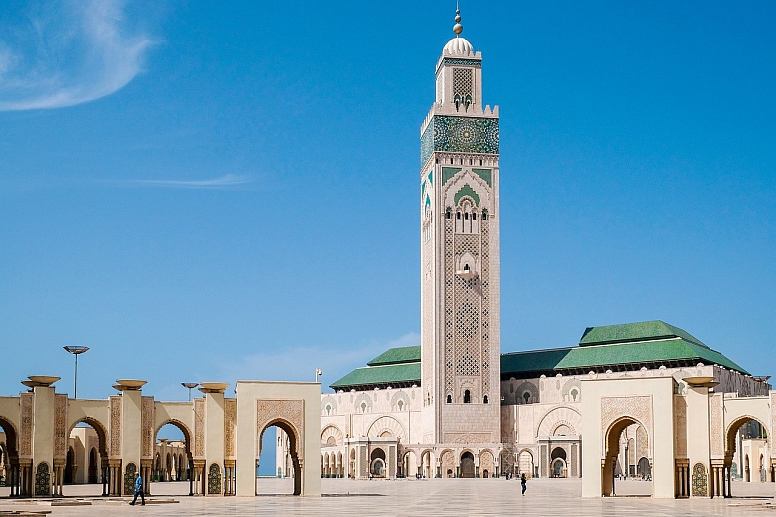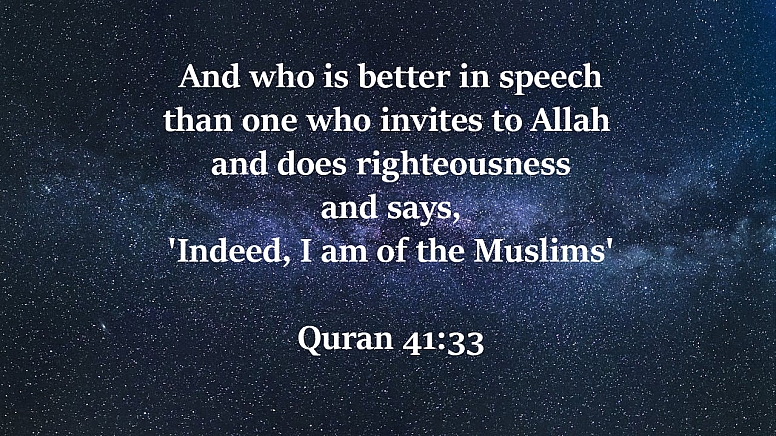
Why Is Islam Becoming the Fastest Growing Religion on The Planet?
In today's world, where religions shape cultures and societies, Islam stands out as one of the fastest-growing religions globally. This phenomenon is not confined to a particular region. But spans continents, influencing diverse populations from Asia to Africa and Europe to the Americas.
Understanding why Islam is expanding rapidly requires exploring various factors ranging from demographics to social dynamics and cultural appeal.
Demographic Shifts and Population Growth
Demographic trends are one of the reasons for Islam's rapid growth, as Muslims have a higher birth rate compared to some other religious groups globally. This demographic advantage means that Muslim communities tend to grow faster in population size over time. Countries with large Muslim populations, such as Indonesia, Pakistan, and Bangladesh, contribute significantly to this growth.
Moreover, migration patterns also play a role. Muslims have migrated to different parts of the world, establishing communities and spreading their faith. This migration, coupled with higher birth rates, contributes to the numerical growth of Islam in various regions, including Europe and North America.
Education and Da'wah (Invitation to Islam)
The efforts of Da'wah, which means inviting others to Islam, is a core practice in Islam. Many Muslims actively engage in educating others about their faith, which can lead to reversions. The spread of information through media, literature, and personal communications has also facilitated the spread of Islamic teachings globally.
From an Islamic perspective, the spreading of the awareness of Islam is seen as a duty for all Muslims. The Qur'an and Hadith (sayings of Prophet Muhammad, Peace be upon him) emphasize the importance of spreading the message of Islam. For instance, the Qur'an states:

Religious Reversion and Appeal
Beyond demographics, Islam's appeal to reverts is another factor driving its growth. Many people are drawn to Islam for its clear moral and ethical teachings. Monotheistic beliefs and emphasis on community and social justice. The simplicity of its central creed, the Shahada ("There is no god but Allah, and Muhammad is the Messenger of Allah") resonates with individuals seeking spiritual clarity and meaning in their lives.
Reversion to Islam can also be influenced by personal relationships and cultural connections. Experiences that lead individuals to explore and ultimately embrace the faith. The welcoming nature of many Muslim communities towards reverts, coupled with educational efforts about Islam, also facilitates this process. You can even experience this by taking Group Umrah Packages from any good agency for yourself and your loved ones. We are sure you will be pleased with the warm hospitality and welcoming nature of the people you will encounter there.

Here's a breakdown of why Islam attracts reverts:
1. Moral and Ethical Teachings
Consequently, Islamic morality and ethics guide the individual and the social organisation. Fundamental ideas like telling the truth and being kind, not cheating others and being helpful are significant to people interested in explicit rules for living.
2. Monotheistic Beliefs
Islam is anchored on the belief that there is only one God and this is Allah. This monotheistic element is attractive to those who want to communicate directly with God, in the framework of an organisation without the presence of other deities or middlemen.
3. Community and Social Justice
Unity and social justice for all members of society are also stressed in the Islamic faith. Muslim communities are characterised by unity and cooperation, as well as concern for the needy and unfortunate. These characteristics can appeal to people in the search for identity and a place to make a positive difference in the community.
4. The Shahada
The Shahada, the declaration of faith in Islam, is both straightforward and profound. Its power lies in its simplicity: "La ilaha ill’Allah, Muhammadur Rasul Allah," which means "There is no god but Allah, and Muhammad is His Prophet." This essential affirmation offers followers a clear and certain expression of their faith.

Most people who accept Islam do so after experiencing an interaction with a Muslim who portrays the features of Islam in modern life. These associations produce first-hand encounters with elements of the Islamic religion's policies. Procedures, which develop an interest in the religion and result in an exploration of the religion.
Hear and sight also influence since people are likely inclined towards Islam. Due to cultural interactions in the form of art and other related aspects of the Islamic cultural domain.
5. Welcoming Community and Educational Efforts
Muslims warmly welcome reverts with joy, offering newcomers explanations, fellowship, and acceptance. Educational programs within these communities provide opportunities to learn about the teachings, practices, and history of Islam.
Social and Political Factors
The social and political landscape of various regions also shapes Islam's growth. In some areas, Islam has become a marker of identity and a form of resistance against Western cultural dominance or political oppression. Movements advocating for Islamic governance or social justice resonate with certain segments of the population, enhancing the appeal and growth of Islam as a comprehensive way of life.
Furthermore, efforts by Muslim organizations and communities to engage with broader society and promote understanding of Islamic principles contribute to the positive perception of Islam among diverse populations. Initiatives such as interfaith dialogue, charitable activities, and educational outreach are crucial in fostering goodwill and promoting a deeper understanding of Islam.
Technological Advancements and Global Connectivity
In the digital age, technology has significantly facilitated the spread of information about Islam and the connection of Muslims worldwide. Social media platforms, websites, and online communities allow Muslims to engage with each other, share religious knowledge about things such as how to perform the rituals of Umrah and present Islam to a global audience.
Millions of people perform Umrah each year, often choosing the most auspicious times. Ramadan considered the holiest month, is particularly favoured for performing Umrah, as it brings abundant blessings. If you are planning to perform Umrah then go for Ramadan Umrah Packages from any good travel agency. Because of the advanced technology, you can also book Umrah from any online travelling platform easily.
Moreover, technology has facilitated access to Islamic resources, such as Qur'anic texts, Hadith collections, and scholarly interpretations. This accessibility has empowered individuals to learn about Islam independently and make informed decisions about embracing the faith.

Here's how technology has contributed to the spread and understanding of Islam:
1. Social Media Platforms and Online Communities
Communicational sites and applications, for instance, Facebook, Twitter, Instagram, and YouTube, have proved to be essential tools Muslims use to share knowledge. These platforms offer channels through which followers can disseminate information on the teachings of Islam. Global events, and one’s experiences in the faith. These trends help all Muslim people worldwide communicate. Support each other and spread the teachings of Islam to the whole wide world.
2. Websites and Online Resources
There are hundreds of Websites, online resources, and information centres based on Islam. Anyone with internet access would enjoy abundant informative privileges. Some of the Islamic resources used include the Qur’an, other Scriptures, and Hadiths, which are the sayings and actions of Prophet Muhammad, Peace be upon him and Tafsir, which is an interpretation of the Qur’an and Islamic history, and any other guidelines on religious practices.
3. Educational Platforms and Apps
Specifically, applications and IT platforms are related to education and focus on accepting knowledge about Islam. Other such apps offer a schedule for prayers, recitation from the Qur'an, and teaching about the religion. Scholar's seminars and classes are conducted online. The web makes it possible for Muslims to expand their knowledge of aqidah (Islamic theology), Fiqh (Islamic jurisprudence) and Tasawwuf (Islamic spiritual path). They are definite platforms that eliminate geographical barriers, allowing Muslims across the globe to be able to gain quality education and relate with knowledgeable teachers.
4. Access to Islamic Texts and Scholarship
This indicates that technological advancements have greatly and positively impacted the accessibility of Islamic texts. Numerous digital libraries and repositories host hundreds of thousands, often millions, of Islamic books, articles, and research papers on various topics. These resources allow people to engage with diverse opinions and deepen their understanding of Islamic principles. Such openness enables both Muslims and non-Muslims to independently explore Islamic scholarship and make informed decisions about their beliefs and religious matters.
5. Global Connectivity and Unity
Technology connects Muslims around the world and fosters unity by facilitating global interactions. Through email or social media platforms, Muslims can participate in congregational prayers and receive fatwas from scholars in different countries. They can also engage in charitable activities without geographical constraints. This integration strengthens the global Muslim community (ummah), promoting unity in addressing shared gains, losses, and social or political issues.
Islam's rapid growth as the fastest-growing religion globally can be attributed to demographic shifts, religious reversion, social and political factors, and technological advancements. Understanding these dynamics helps explain why Islam continues to expand its influence and presence across continents, shaping the religious landscape of the 21st century.
As demographics evolve and global connections strengthen, Islam's growth trajectory is likely to persist, profoundly influencing societies and cultures.

Here are some FAQs that address and debunk common myths about why Islam is growing and becoming one of the most followed religions:
FAQ 1: Is Islam spreading primarily through forced reversions?
Myth: Islam spreads mainly through coercion and forced reversions.
Reality: Forced reversions are against the teachings of Islam. The Qur'an states, "There is no compulsion in religion" (Qur'an 2:256), emphasizing that faith must be accepted freely. The growth of Islam is largely attributed to personal choice, natural population growth, and the active efforts of Da'wah (invitation to Islam).
FAQ 2: Is the high birth rate among Muslims the only reason for Islam's growth?
Myth: Islam is growing only because Muslims have higher birth rates.
Reality: While higher birth rates in Muslim-majority countries do contribute to population growth, it is not the sole reason. Reversion, migration, and the retention of faith across generations also play significant roles. Additionally, Islam attracts a substantial number of reverts each year from diverse backgrounds.
FAQ 3: Does Islam spread through violence or terrorism?
Myth: Islam spreads through violent means and terrorism.
Reality: The vast majority of Muslims around the world condemn violence and terrorism. Extremist groups represent a tiny fraction of the Muslim population and their actions are widely rejected by mainstream Islam. The peaceful teachings of Islam and the community-oriented lifestyle are what attract people to the faith.

FAQ 4: Is Islam only appealing to uneducated or impoverished people?
Myth: Islam appeals mainly to uneducated or poor individuals.
Reality: People from all walks of life, including highly educated and affluent individuals, revert to Islam. The intellectual, spiritual, and moral teachings of Islam appeal to a broad spectrum of people regardless of their socio-economic status. Prominent reverts include scholars, scientists, and professionals.
FAQ 5: Are Muslims reverting people by exploiting their vulnerabilities?
Myth: Muslims exploit the vulnerabilities of people to revert them.
Reality: Ethical principles in Islam prohibit exploiting individuals. Reversions generally occur through personal reflection, positive interactions with Muslims, and an appreciation for Islamic teachings. Many reverts report a deep spiritual connection and an informed decision to embrace Islam.
FAQ 6: Is Islam's spread limited to certain regions or demographics?
Myth: Islam is spreading only in certain regions or among specific demographics.
Reality: Islam is growing globally, not confined to any specific region or demographic. There are vibrant Muslim communities in Africa, Asia, Europe, the Americas, and Oceania. The faith attracts people of all ages, ethnicities, and social backgrounds.
FAQ 7: Does Islam discourage integration into non-Muslim societies?
Myth: Islam discourages Muslims from integrating into non-Muslim societies.
Reality: Islam encourages Muslims to be active and positive members of their societies. Many Muslims live harmoniously in multicultural and multi-faith environments, contributing to various aspects of society while maintaining their religious identity. The Prophet Muhammad, Peace be upon him, emphasized good character and positive interactions with all people.
FAQ 8: Are Muslims commanded to replace other religions?
Myth: Muslims are commanded to replace other religions.
Reality: Islam respects the right of individuals to follow their faith. The Qur'an acknowledges the existence of other religions and emphasizes peaceful coexistence and dialogue. Muslims are encouraged to share their faith but also to respect others' beliefs.

FAQ 9: Are most reverts to Islam "broken" people seeking refuge in religion?
Myth: Reverts to Islam are typically "broken" individuals looking for an escape or refuge in religion.
Reality: This stereotype is both inaccurate and unfair. While it is true that some individuals turn to religion during difficult times, the reasons for reverting to Islam are diverse and complex. Many reverts are attracted to Islam through positive experiences, intellectual exploration, and spiritual fulfilment. Here are some points to consider:
-
Intellectual Curiosity: Many reverts are thoughtful individuals exploring various philosophies and religions before embracing Islam. They often find the philosophical and theological depth of Islam compelling.
-
Spiritual Search: Numerous reverts report that Islam provides the spiritual peace and connection they were seeking. They are drawn to the faith's comprehensive approach to spirituality and daily life.
-
Positive Interactions: Personal relationships and positive experiences with Muslims frequently play a significant role. Observing the character, hospitality, and community spirit of Muslims can inspire interest and respect for the faith.
-
Cultural Appreciation: Some reverts are drawn to Islam's rich cultural and historical heritage. The art, literature, and traditions associated with Islamic civilizations often pique interest.
-
Ethical and Moral Appeal: Islam's ethical and moral teachings, such as its emphasis on justice, charity, and family values, resonate with many people seeking a principled way of life.
-
Community and Belonging: The sense of community and belonging within the Muslim Ummah (global community) can be very appealing. Reverts often find a supportive and welcoming community in Islam.
-
Personal Conviction: Ultimately, reversion is a personal journey. Many reverts experience a profound inner conviction and connection to Islamic teachings that leads them to embrace the faith.
Testimonials from Reverts
-
Lauren Booth, a British journalist and sister-in-law of former British Prime Minister Tony Blair, reverted to Islam after a spiritual journey that included visits to the Middle East and deep reflection on her purpose in life.
-
Yusuf Islam (formerly Cat Stevens), a famous musician, reverted after a near-death experience and extensive study of religious texts, finding answers in Islam that resonated deeply with him.
The idea that reverts to Islam is predominantly "broken" people looking for refuge is a myth that overlooks the diverse and profound reasons individuals choose to embrace Islam. Each revert has a unique story, often marked by intellectual curiosity, spiritual fulfilment, and positive personal experiences. It is important to recognize and respect the agency and informed choices of those who revert to Islam.
These FAQs highlight that the spread of Islam is multifaceted and grounded in its spiritual, ethical, and communal teachings rather than coercion or exploitation.









